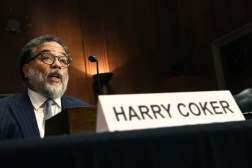US National Cyber Director plans Japan trip to bolster digital cooperation

U.S. National Cyber Director Chris Inglis plans on traveling to Japan later this month to advise government officials there on bolstering cybersecurity defenses, according to a source briefed on the upcoming trip.
The official visit appears to be an effort to improve cybersecurity cooperation with a key ally in Asia amid a strained relationship between the United States and China, according to two people who confirmed Inglis’ travel plans but asked not to be named because they are not authorized to speak to the press.
The Biden administration wants to encourage all friendly nations to accelerate cybersecurity investments, said Mark Montgomery, former executive director of the Cyberspace Solarium Commission who now runs the Center on Cyber and Technology Innovation at Foundation for Defense of Democracies.
Montgomery said he expects the trip to include a bit of “cheerleading” and encouragement of “cyber resilience and preparation” among U.S. allies and partners, which is a significant objective for the White House. Beyond that, he said, he expects Inglis likely will “talk to them about their capacity building [and] about contributing to international cyber capacity building efforts with developing Southeast Asian countries.”
Additionally, U.S. officials could be looking for stronger connections on cyber issues in Asia as both Chinese and North Korean hackers are poised to become and even bigger threats in years to come.
It makes sense for American officials to focus on making Japan a “stronger cybersecurity partner in the Indo-Pacific at a critical moment with a rising China, emboldened North Korea, and violently adventurist Russia,” said Jen Roberts, a program assistant at the Atlantic Council’s Cyber Statecraft Initiative.
Japan has already been investing more in cybersecurity after several high-profile hacks, such a series of breaches last spring, including one that resulted in the leak of more than more than 70,000 emails from various government agencies. In September, Japanese officials announced they were investigating the pro-Russian group Killnet after attacks on several government websites.
Montgomery noted that he’s spoken with several Japanese officials recently who are interested in learning more about the Solarium Commission report issued in 2020. “Like us, the Japanese have a lot of work to do on cyber resilience and cyber defense,” he said.
Japan significantly increased its focus on cybersecurity in the run up to the 2020 Tokyo Olympics and has boosted spending on protecting critical infrastructure too.
Furthermore, officials are expanding the country’s National Center of Incident Readiness and Strategy for Cybersecurity, the Atlantic Council’s Roberts pointed out. She said the expanded center is slated to open in 2024 and will “drive operational collaboration and not just facilitate communication.”



